综合英语教程1册U3
大学英语综合教程1Unit3习题答案解析

Key to Exercises (Unit 3)Text comprehension:I. AII.F, T, T, T, FIII. 1. Refer to Para 1 for the four examples.2. Refer to Para 4. It could not only set an example for your children and grandchildrenbut it adds priceless panache to your image.3. Refer to Para 5. The fact that the guest had included a recipe for a dish the author hadcomplimented her on at an earlier gathering made the author feel all the more appreciative.4. Refer to Para 7. It is the simple phrase "Excuse me".5. Refer to Para 9. It is because to use good manners with our own families counts themost, for those are the people we love the most.6. As good manners are infectious, she wishes that everyone would catch them so thatthey would spread..IV. 1. a gracious manner adds great splendor to your image.2. I dare say the note my guest sent me didn't take long to write.3. The simple phrase "excuse me" made most of your irritation disappear.4. Being punctual has always been considered a virtue, both in the past and at present; ithas not become outdated.VocabularyI. 1. become different from what it should be like2. displaying gratitude by waving a hand or nodding the head; move out onto the mainroad3. be of great significance4. who receives the thank-you note remark5. produce a far-reaching effect6. practice good mannersII. Punctuality, routine, infectious, bet, terrific, board, valued, count, cherishes, irritations III. D, A, B, B, C, A, D, AIV. 1 praised, compliment, praise, complimented2. appreciated, enjoyed, enjoying, appreciated3. priceless, priceless, precious, precious4. see, Notice, see, noticedV. 1. thanks (recognition)2. activeness (liveliness, briskness, eagerness)3. fashionable ( graceful, elegant)4. selfish (mean, ungenerous)5. nice (courteous, polite, friendly)6. leisurely (relaxed, idle, unoccupied, lazy)7. annoyance (displeasure, dissatisfaction)8.promptness ( timekeeping, reliability)VI. unfriendly, boyhood, understanding, reception, disappearance, decision,differing, elevatedGrammarII. 1. older than2.more interested3. as crowded as4. As pale as5. More exciting than6. As complicated7.easier than8.nicer9. more selective10.nicer11.as unlucky as12. more difficultIII. 1. stronger2. more noisy3. more expensive4. more difficult5. happier6. younger7. more often8. further9. more exciting10. louderIV. 1. more comfortable2. the funniest3. the worst4. more serious5. the most popular6. quieter7. the most beautiful8. healthier9. the least honorable10. less challenging; least challengingV. 1. Older 2. Oldest 3. True 4. True 5. Further 6. A more 7. Better 8.true VI. e.g. But even worse was the fact that the headmaster had found out the boys' secret plan.Translation exercisesI.1. 譬如,我在纽约就看到这样的差别,与我20多年前刚搬来时大不相同了:人们蜂拥走进电梯,却没有让电梯里的人先出来;别人为他们开门时,从来不说“谢谢”;需要同事给他们递东西时,从来不说“请”;当其他开车人为他们让道时,也从不挥手或点头表示谢意。
全新版大学英语综合教程 1 Unit3 课文注释电子书及翻译
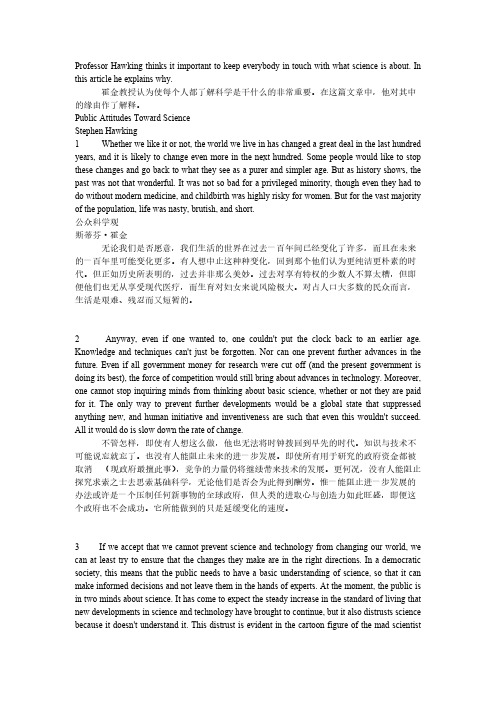
Professor Hawking thinks it important to keep everybody in touch with what science is about. In this article he explains why.霍金教授认为使每个人都了解科学是干什么的非常重要。
在这篇文章中,他对其中的缘由作了解释。
Public Attitudes Toward ScienceStephen Hawking1 Whether we like it or not, the world we live in has changed a great deal in the last hundred years, and it is likely to change even more in the next hundred. Some people would like to stop these changes and go back to what they see as a purer and simpler age. But as history shows, the past was not that wonderful. It was not so bad for a privileged minority, though even they had to do without modern medicine, and childbirth was highly risky for women. But for the vast majority of the population, life was nasty, brutish, and short.公众科学观斯蒂芬·霍金无论我们是否愿意,我们生活的世界在过去一百年间已经变化了许多,而且在未来的一百年里可能变化更多。
大一英语综合教程1单词整理unit 3

likelyprivilegedprivilegean exclusive privilege minoritymajoritybe in a/the minoritya minority ofhighlyriskynastybrutishanywaycompetitionmoreoverinquireinquiringglobalsuppressinitiativehave/size the initiative on one’s own initiative take the initiative initiate inventivenessrateensuredemocratic democracy informedinformsteadysteady as a rockgo steadyevidentcartoonelementastronomyseriesfictionharnessbackgroundacid adj.可能的adv.可能adj.有特权的n.特权专有特权n.少数n.多数adv.很,非常adj.危险的,有风险的adj.令人难受的adj.野兽般的,野蛮的adv.不管怎么说n.竞赛,比赛adv.而且,再者v.询问adj.好问的,爱探索的adj.世界的,全球的vt.抑制,压制n.首创精神,主动掌握主动权主动地带头倡导v.开始,发动n.发明才能,创造力n.速度,比率vt.保证,确保adj.民主的n.adj.有知识的,了解情况的;明智的vt.告诉,通知adj.平稳的,稳定的稳如磐石(男女关系)确定adj.明显的n.漫画;动画片n.成分,元素n.天文学n.连续;系列;系列节目n.小说;虚构vt.驾驭,利用n.背景adj.&n.酸(性的);酸味的(物质)greenhousenuclearweapongeneticengineeringbasisrotelearn by roterelevanceequationbriefmathematicalhalvetendpreciseaccuracybe accurate in (doing) sth. qualitativegraspconceptsufficientbe sufficient/adequate to do/for sth. Have sufficient faith in sth. conveydiagramframeworkmoleculartransistorproportionin inverse proportion toin direct proportion toin proportiontrulymagicproducerresponsibilityeducateentertainhencecontactaliencivilizationput acrossfit into n.温室adj.原子核的,核心的n.武器adj.基因的,遗传(学)的n.工程;工程学n.基础n.死记硬背死记硬背地学习n.相关,关联n.等式,方程(式)adj.简洁的,短暂的adj.数学的vt.将……减半vi.倾向,趋向adj.精确的n.准确adj.定性的;性质上的n.掌握,了解n.概念adj.充分的,足够的vt.传达,表达n.图表;图解n.结构;框架adj.分子的n.晶体管;晶体管收音机n.比例;部分反比正比符合比例adv.真正地;确实地n.魔术;魔力n.(电影、电视片等的)制片人;生产者,n.责任vt.教育vt.给…以欢乐;招待adv.因此,从此vt.与…接触adj.外国的;陌生的n.文明解释清楚,使被理解适合;符合;属于in the form ofin terms oflie inat the momentin two minds about slow downbring aboutbring upbring forthbring forwardput/turn the clock back do withoutdo away withdo updo something with cut off 呈…的形状;以…形式从…方面(或角度)来说;按照;根据在于此刻,目前犹豫不决,三心二意减慢引起,导致教育,养育,提出产生,提出提前,提出倒退,开倒车没有…而设法对付过去取消,拜托,废除整理,刷新,修缮,使筋疲力尽切断,中断;切下,剪下。
全新版大学英语综合教程第一册课件Unit3

Before Reading
Global Reading
Detailed Reading
After Reading
Supplementary Reading
— 1977 — 1979
Became a professor of physics. Appointed Lucasian Professor of Mathematics at Cambridge, a post once held by Isaac Newton.
For the vast majority of the population, life was nasty, brutish, and short.
Before Reading
Global Reading
Detailed Reading
After Reading
Supplementary Reading
Before Reading
Global Reading
Detailed Reading
After Reading
Supplementary Reading
A Brief History of Time One of his books to make his work accessible to the public.
Before Reading
Global Reading
Detailed Reading
After Reading
Supplementary Reading
After Reading
Supplementary Reading
Questions and Answers 1) What is the attitude of some people towards the changes brought about by science and technology? Some people would like to stop these changes and go back to what they see as a purer and simpler age. 2) What was life like before science and technology began to change our way of life?
大学英语综合教程BOOK1 Unit 3
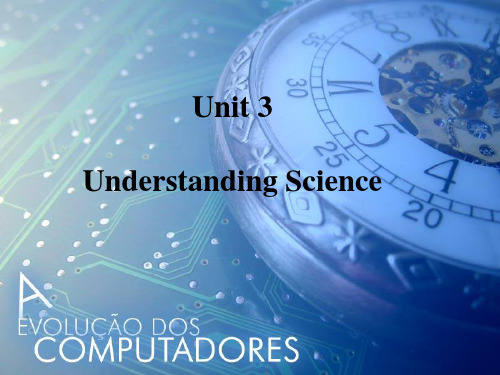
1) Our civilization is more advanced than other alien civilizations according to the joke. ( T )
2) We have not been contacted by an alien civilization because of the insufficient development of the science and technology.
Mr. Smith was a highly successful salesman. 2) to a high degree
He speaks very highly of you. 出席这次会议的大部分人是受过高等教育 的女性。 Most of the people present at the meeting are highly educated women.
Brief Introduction to Stephen Hawking
Stephen Hawking (1942~ ): British theoretical physicist and mathematician
Chronology of Stephen Hawking
— 1942 — 1958
(F)
We have not been contacted by an alien civilization because any alien civilization tends to destroy themselves when they reach our stage. 3) The author has had sufficient evidence to prove that the joke is wrong. (F) The author has not had sufficient evidence, but he believes that the good sense of the public might prove the joke is wrong.
大学综合英语教程第一册Unit 3

5. What good manners does the writer suggest that we should display?
6. Do you agree with the writer that good manners with our families count the most? Justify your reply.
精品PPT
Pre-reading
Saying “Thank you.” — When do you say “Thank you” to others?
Do you say “Thank you” in the following situations?
someone holds a door open for you
Para. 1: a social phenomenon — many people in present times are not as polite as people in the past
Paras. 2 – 4:
the author’s viewpoint — one cannot be truly stylish without good manners, and good manners are a sort of hidden beauty secret Paras. 5-10: illustrations of good manners — the great power of some typical good manners and the good effects polite manners have on our own family members Para. 11: the author’s sincere wish — everyone would show good manners
Unitthree完整答案-新目标大学英语《综合教程》第一册
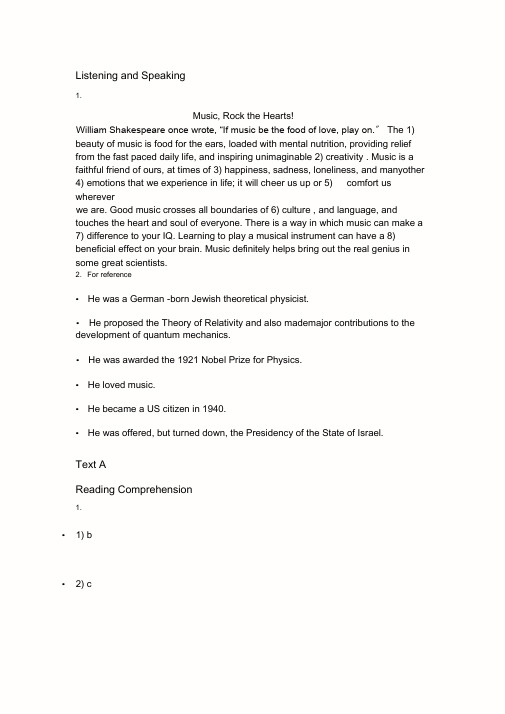
Listening and Speaking1.Music, Rock the Hearts!William Shakespeare once wrote, “If music be the food of love, play on.〞 The 1) beauty of music is food for the ears, loaded with mental nutrition, providing relief from the fast paced daily life, and inspiring unimaginable 2) creativity . Music is a faithful friend of ours, at times of 3) happiness, sadness, loneliness, and manyother4) emotions that we experience in life; it will cheer us up or 5) comfort uswhereverwe are. Good music crosses all boundaries of 6) culture , and language, andtouches the heart and soul of everyone. There is a way in which music can make a7) difference to your IQ. Learning to play a musical instrument can have a 8)beneficial effect on your brain. Music definitely helps bring out the real genius in some great scientists.2. For reference•He was a German -born Jewish theoretical physicist.•He proposed the Theory of Relativity and also mademajor contributions to the development of quantum mechanics.•He was awarded the 1921 Nobel Prize for Physics.•He loved music.•He became a US citizen in 1940.•He was offered, but turned down, the Presidency of the State of Israel.Text AReading Comprehension1.•1) b•2) c•4) e•5) f•6) d•7) j•8) g•9) h•10) i2.A. Einstein ' s academic popularity:1) There is no other personality in the academic world that has even half Einstein ' spopularity .2) There is no genius in the world as respected and as loved as Albert Einstein.3) Nowherein the world could we find another academic that rivals the popularity ofrock superstars.4) His opus “E=mcT would rival any Beatles ' platinum record .5) His “Theory of Relativity“ even shook Newton s gravitationaltheory off the charts .B. Einstein ' s love of and gift for music:1) Had he lived later, he could easily pass as the only male member of the Bondelectric Quartet.2) Had he not been a scientist , he would have been a musician.3) Einstein, with unclipped moustache and unkempt hair, did actually perform insolo concerts !4) Einstein shone in a deeply felt performance of an adagio from one of theBeethoven sonatas before his 17th birthday .5) In addition to his prowess on the violin, he also played the piano and, inparticular, loved to improvise .C. Einstein ' s gift brought ou t by music:1) Albert Einstein believed that he got most joy in life out of music.2) Albert Einstein himself admitted that the reason he was so smart was becausehe played the violin .3) One friend, G. J. Withrow, confided that the way Einstein dealt with problems andequations was by improvising on the violin .4) Einstein ' s second wife, Elsa said that music helped him when he was thinkingabout his theories .5) His son Hans said that Albert Einstein took refuge in music, whichwould usually resolve all his difficulties.Reading and Discussing3.For reference1) Albert Einstein himself admitted that the reason he was so smart was becausehe played the violin. One friend, G. J. Withrow, confided that the way Einstein dealt with problems and equations was by improvising on the violin. His second wife, Elsa, said music helped him when he was thinking about his theories. His son Hans Albert Einstein too recalled his father using music as a tool to help his work.2) Music is important to most people, including me. Music can help me concentrateon myhomework. Music is a way of life. It can be interpreted in manyways and life without it would be like life without color. It gives me a chance to express myself in ways that nothing else can.Language in Use4., 1) popularity•2) gorgeous•5) is/was revealed •6) professionals•7) was resolved•8) genius•9) icon•10) was adored5.•1) gives a glimpse of•2) based on•3) deal with•4) pass as/for•5) had jotted down•8) fall in love6.•e) bring forward•f) bring back, g) bring up, h) bring in•1) bring about•2) brought back/brings back•3) bring up, 4) bring forth•5) bring out•6) bring …down, 7) bring in7.•1) hardship•2) popularized•3) Creative•4) consumption•5) significant•6) admirable•7) simplify•8) musical•9) performance•10) professional8.Reference translation1〕描述天才时,爱因斯坦是你能找到的最适宜的例子,就连小孩都熟悉他.2〕在学术界,其他人的知名度连爱因斯坦的一半都不及.3〕世界上没有哪个天才如同阿尔伯特?爱因斯坦一样受到人们如此的尊敬和爱戴.他那留着与众不同的发型的照片甚至成为一种流行文化的标志.4〕全世界都找不到另一个像他那样的学者,其知名度可以与摇滚巨星媲美.5〕没有谁比父母更爱你.9.Reference translation1) Country music is one of the most popular forms of music in the United States today.2) There is no other misfortune that could be compared with the loss of time.3) There is no friend as loyal as a good book.4) Nowhere else in the world can you find scenery as attractive as in Switzerland.5) No cassette tapes could rival CDs in terms of sound quality.Text BReading Comprehension1.Research question: Is playing your favorite song an easy way to make homework bearable, or are you hurting your performance?Previous research: Numerous benefits from listening to music: itimproves attention, memory, and even mental math ability; it also alleviates depression and anxiety.Research method: Students were given a serial recall test in five different scenarios: 1) a quiet environment; 2) with “steady state 〞speech; 3) with "changing state “ speech; 4) with “liked “ music, a song of the students ' choice; 5) with “disliked “ music.Findings: 1) No significant difference between test scores with likedmusic, disliked music, and changing state speech. 2) Scores were significantly higher for tests taken in a quiet environment or with steady state speech.Conclusion: In general, it seems that music with vocals is distracting,while instrumental music might actually help your performance.Language in Use2.•1) bet•2) preferences•3) distracting•4) be alleviated•5) implies•6) affecting•7) random, 8) spatial•9) subjective•10) variations3.•1) a variety of•2) feel like resorting•3) In general•4) in other words•5) lighten up•6) tune out4.Reference translation1)之前的研究发现,在完成某一任务之前听音乐有许多好处:可以提升注意力、记忆力,甚至心算水平.2)然而,更加现实的情况却是,学生边听背景音乐边学习或者做家庭作业.3)令人惊讶的是,实验结果竟然显示,无论受试者听喜欢的、不喜欢的音乐或者持续变化的言语,测试成绩并没有明显区别.4)研究者们推测,如果他们用阅读理解测试来重复这次实验程序,可能会得到相似的结果.5)所以你是不是应该一边学习或做家庭作业一边听音乐呢?WritingExercise 1Para. 1“genius “ and his name immediately comes to mind.1) General idea: Say2) Examples: Einstein is the closest you get to describing genius; even small kids know him. There is no other personality in the academic world that has even half Einstein ' s popularity.3) By supplying these examples, the author adds more information about who the genius is, how popular he is, and why he is the person people will mention when talking about genius.Para. 21) General idea: There is no genius in the world as respected and as loved as Albert Einstein.2) Example: His picture with his distinctive hairstyle even became a pop culture icon.3) By supplying this example, the author adds specific evidence about how people love and admire Einstein.Para. 31) General idea: Nowherein the world could we find another academic that rivals the popularity of rock superstars.2) Examples: His opus "E=mc' would rival any Beatles ' platinum record, his “Theory of Relativity “ even shook Newton ' s gravitational theory of f the charts.3) By supplying the examples, the author adds more specific evidence about how popular he is compared with rock stars and other scientists.Exercise 2Music Fuels My MoodSample 1Music never fails me. The beauty about it is that I can always find a song to identify with, whether at a time of happiness, loneliness or sorrow.Some scientists have found that people can boost their mood simply by listening to upbeat music. For instance, I listen to pop music with happy melodies when I have something to celebrate. Whenfeeling relaxed, I love to lie back and listen to jazz in particular. While I amdisturbed by the problems of my study, soft music without lyrics will soothe me and makemeconcentrate. To me, listening to music can fuel my soul and ultimately lead to a better quality of life.Sample 2Everyone has an instinctive understanding of how music interacts with our moods. Somescientists have found that listening to music can improve our moods. Of all types of music I love classical music most because it gives mepower and comfort. At a time of happiness, classical music creates such a calming atmosphere that I feel completely at peace. When life disappoints me, however, those masterpieces encourage me and give me strength to recover. Specifically, I love Bach' s music best. Somepieces help me concentrate during work while some other pieces assist me in battling insomnia. Listening to classical music fuels my life and leads to a better quality of life.。
Unit3大学英语综合教程1课后答案
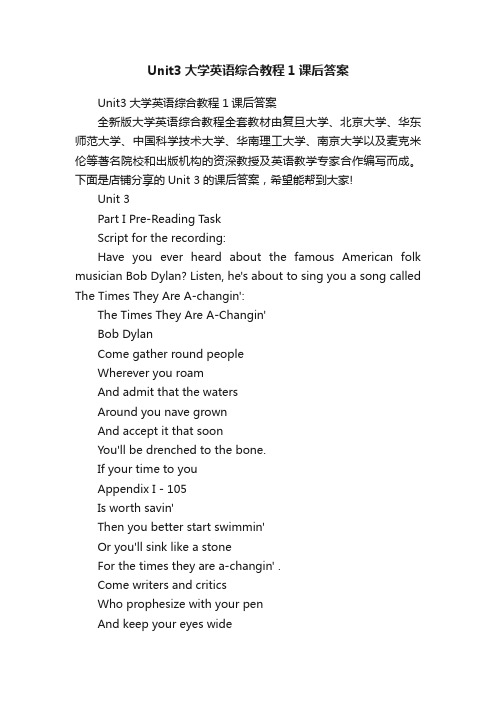
Unit3大学英语综合教程1课后答案Unit3大学英语综合教程1课后答案全新版大学英语综合教程全套教材由复旦大学、北京大学、华东师范大学、中国科学技术大学、华南理工大学、南京大学以及麦克米伦等著名院校和出版机构的资深教授及英语教学专家合作编写而成。
下面是店铺分享的Unit 3的课后答案,希望能帮到大家!Unit 3Part I Pre-Reading TaskScript for the recording:Have you ever heard about the famous American folk musician Bob Dylan? Listen, he's about to sing you a song called The Times They Are A-changin':The Times They Are A-Changin'Bob DylanCome gather round peopleWherever you roamAnd admit that the watersAround you nave grownAnd accept it that soonYou'll be drenched to the bone.If your time to youAppendix I - 105Is worth savin'Then you better start swimmin'Or you'll sink like a stoneFor the times they are a-changin' .Come writers and criticsWho prophesize with your penAnd keep your eyes wideThe chance won't come again And don’ t speak too soonFor the wheel's still in spinAnd there's no tellin' whoThat it s namin’ .For the loser nowWill be later to winFor the times they are a-changin' . Come senators, congressmen Please heed the callDon't stand in the doorwayDon't block up the hallFor he that gets hurtWill be he who has stalled There's a battle outsideAnd it is ragin .It'll soon shake your windows And rattle your wallsFor the times they are a-changin' . Come mothers and fathers Throughout the landAnd don t criticizeWhat you can't understandYour sons and your daughters Are beyond your commandI- 106 - Appendix IYour old road isRapidly agin'.Please get out of the new oneIf you can't lend your handFor the times they are a-ckangin' .The line it is drawnThe curse it is castThe slow one nowWill later he fastAs the present nowWill later he pastThe order isRapidly fadin'.And the first one nowWill later he lastFor the times they are a-changin' .The song you have just heard was also written by Bob Dylan when a young man in his early twenties. Like many a young man throughout the ages he felt misunderstood by his parents' genera?tion, a generation he was quite happy to blame for all the ills of the world. He saw a gap between young and old, a gap made wider by different attitudes to change, the young welcoming it, the old resisting it. But change is coming whether we like it or not, coming like a flood that no one can escape. So you had better:... admit that the waters around you have grownAnd accept it that soon you'll he drenched to the hone.For those whose job it is to comment on the news and to predict what will happen next, we live in interesting times.Come writers and criticsWho prophesize with your pen And keep your eyes wide The chance won't come againAppendix I - 107 -But they should not be too quick in predicting what is going to happen. The wheel of fortune is still spinning and those at the bottom of society may find themselves later rising up. And so: ... don't speak too soon For the wheel's still in spin Ana there's no telling who That it' s naming For the loser now Will he later to winMany of Dylan's early songs were, like this one, protest songs, songs aimed against injustice. And so he warns politicians not to stand in the way of those who are fighting for justice, a fight that will... soon shake your windows And rattle your walls.He sees his parent's generation as too ready to criticize their children and unable to understand their hopes and dreams: Come mothers and lathers Throughout the land And don't criticize What you don't understandDylan sees the older generation's way of doing things as outdated. If they are unwilling to change their ways then they should step aside and let a new generation take over. As he says to them:Your old road isRapidly a ginPlease get out of the new oneIf you can't lend your handFor the times they are a-changin'- 106 - Appendix IPart II Text AText OrganizationNo. Settings1 A fast-food restaurant2 The Thompson family dining room3 An office at a high school2.Scenes Main IdeasScene One Father embarrassed Sean by talking too proudly to the restaurant Manager.Scene Two Father embarrassed Diane by persuading a work-mate into pressing his son to ask her to the senior prom.Scene Three Father embarrassed Heidi by boasting to an official of her new school about how bright she was.Vocabulary下载文档。
全新版大学英语综合教程 1 Unit3 课文注释电子书及翻译

Professor Hawking thinks it important to keep everybody in touch with what science is about. In this article he explains why.霍金教授认为使每个人都了解科学是干什么的非常重要。
在这篇文章中,他对其中的缘由作了解释。
Public Attitudes Toward ScienceStephen Hawking1 Whether we like it or not, the world we live in has changed a great deal in the last hundred years, and it is likely to change even more in the next hundred. Some people would like to stop these changes and go back to what they see as a purer and simpler age. But as history shows, the past was not that wonderful. It was not so bad for a privileged minority, though even they had to do without modern medicine, and childbirth was highly risky for women. But for the vast majority of the population, life was nasty, brutish, and short.公众科学观斯蒂芬·霍金无论我们是否愿意,我们生活的世界在过去一百年间已经变化了许多,而且在未来的一百年里可能变化更多。
新标准大学英语综合教程1u3教案
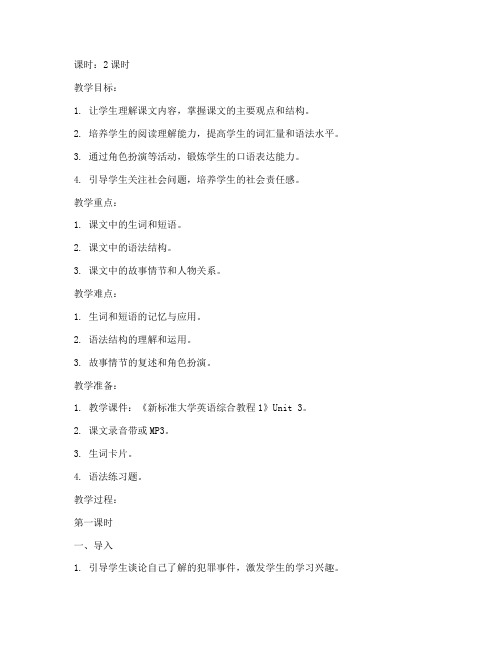
课时:2课时教学目标:1. 让学生理解课文内容,掌握课文的主要观点和结构。
2. 培养学生的阅读理解能力,提高学生的词汇量和语法水平。
3. 通过角色扮演等活动,锻炼学生的口语表达能力。
4. 引导学生关注社会问题,培养学生的社会责任感。
教学重点:1. 课文中的生词和短语。
2. 课文中的语法结构。
3. 课文中的故事情节和人物关系。
教学难点:1. 生词和短语的记忆与应用。
2. 语法结构的理解和运用。
3. 故事情节的复述和角色扮演。
教学准备:1. 教学课件:《新标准大学英语综合教程1》Unit 3。
2. 课文录音带或MP3。
3. 生词卡片。
4. 语法练习题。
教学过程:第一课时一、导入1. 引导学生谈论自己了解的犯罪事件,激发学生的学习兴趣。
2. 介绍本课的主题:Crime Watch。
二、课文阅读1. 学生阅读课文,注意理解课文内容,掌握课文结构。
2. 教师提问,检查学生对课文的理解。
三、词汇学习1. 教师带领学生学习课文中的生词和短语,并进行讲解。
2. 学生跟读生词和短语,加深记忆。
四、语法讲解1. 教师讲解课文中的语法结构,如:现在完成时、条件状语从句等。
2. 学生练习语法,巩固所学知识。
五、课堂活动1. 学生分组讨论课文中的犯罪事件,分析原因和后果。
2. 学生进行角色扮演,模拟警察和罪犯的对话。
第二课时一、复习导入1. 复习上一节课的学习内容,检查学生对课文的理解和语法掌握情况。
2. 引导学生谈谈自己对犯罪问题的看法。
二、课文复述1. 学生分组复述课文内容,注意使用所学词汇和语法。
2. 教师点评学生的复述,纠正错误。
三、写作训练1. 学生根据课文内容,写一篇关于犯罪问题的短文。
2. 教师批改作文,指导学生修改。
四、总结与拓展1. 教师总结本课的学习内容,强调重点和难点。
2. 学生谈谈自己的学习体会,分享学习心得。
3. 引导学生关注社会问题,关注犯罪问题,培养学生的社会责任感。
教学反思:本节课通过阅读、讨论、角色扮演等活动,使学生了解了犯罪问题的严重性,提高了学生的阅读理解能力和口语表达能力。
全新版大学高阶英语第三版综合教程1单词unit 3

unit 3part 1valentine n. one's sweetheart情人straighten vt.使平正make one's way go走,前进absorb vt. completely hold the attention of (sb.); take in 完全吸引住…的注意;吸收pencil vt. write using a pencil 用铅笔写margin n.页边空白;边缘reflect vt. be a sign of, show 反映,显示vi. think quietly and calmly 仔细考虑thoughtful a. thinking deeply;thinking about what other people need 深思的;体贴的insightful a.具有洞察力的insight n.洞察力locate vt. find the exact position of; establish in a certain place 找到…的位置;使坐落于correspond vi. exchange letters regularly 通信ship vt. send or transport (sth./sb.),esp.in a ship(尤指用船)运送overseas ad., a. to or in another country去(在)国外(的),去(在)海外(的)fertile a. (of land) able to produce good crops 肥沃的,富饶的romance n.love; love story爱情;爱情故事bud vi.发芽;萌芽n.(枝叶的)芽;花蕾reality n.真实性;现实basis n.基础haunt vt. make (sb.) worry or make (them) sad; (of ghosts) visit (a place)regularly使担忧,使苦恼;(鬼魂)常出没于take a chance (on sth.) attempt to do sth. in spite of the possibility of failure; take a risk碰运气;冒险disgust vt. make (sb.) feel a strong sense of dislike 使厌恶,使反感whichever pron. no matter which 无论哪个或哪些schedule vt,为…安排时间lapel n.(西服上衣的)翻领sustain vt. support emotionally;,keep (an effort, etc.) going, maintain支持;使(努力等)持续下去,保持unfailingly ad. always; without fail永远;必定slim a.slender;small 苗条的;细小的,微小的curl n.鬈发delicate a. small and beautifully shaped秀美的;精致的chin n.下巴,颏firmness n.坚固;坚定springtime n.春季come alive 变得生机勃勃provocative a.挑逗的;挑衅的curve v.(使)弯曲go one's way go in one's direction 与某人同路murmur* v.轻声说,咕哝uncontrollably ad.控制不住地pin vt. 别住; 固定overweight a. exceeding the normal (bodily) weight 超重的;肥胖的ankle n.踝; 踝节部thick-ankled with thick ankles 脚踝粗的thrust (thrust)v挤入;插入,猛推heel n.(鞋、袜等的)后跟; 脚后跟,踵low-heeled a.低跟的split (split) v. (cause to) break in to two or more parts(使)裂开;(使)破裂keen a. (of interest, feelings, etc.)strong;deep强烈的;热切的longing n.earnest desire 渴望companion vt. spend time or go somewhere with (sb.)陪伴uphold* (upheld /upheld/) vt.support支持,维护sensible a. showing or having good sense 通情达理的,理智的kindly a.亲切的;和蔼的; 仁慈的glow n.a warm light 光亮,光辉hesitate vi. pause before doing sth.or making a decision 踌躇,犹豫grip v. take a tight hold (of) 握紧,紧握leather n.(动物的)皮,皮革identify vt. recognize or say.who or what (sb./ sth.) is 识别grateful a. feeling or showing thanks to another person 感激的square vt.挺直(肩膀)salute* v(向…)行举手礼hold (sth.)out 递出(东西)even though 虽然; 尽管choke v(使)说不出话来;(使哽咽)bitterness n.苦味;苦难disappointment n.失望,沮丧lieutenant* n.海军上尉;陆军中尉broaden v. make or become broader(使)变宽;(使)扩大wisdom n.智慧; 明智in response to in answer to 作为对…的回应unattractive a.无吸引力的:;无魅力的mingle v.相混合divine a.神圣的thine pron.(古)=yoursclasp vt. 抱紧disdain vt 郚视thou pron.(古)=youpart3wallet n.钱包,皮夹date vt, 注明…日期make out manage to see or read 辨认出hope for want and expect (sth.)希望,期待clue n.线索call in visit a place or a person, esp.for a short time 作短暂访问know of(sb./sth.) have information about (sb./sth.)知道(某人/某事)一些情况nursing home (尤指接纳老年人的)私人疗养院exchange vt,交换,互换silver-haired a.头发银白的contact n.联系;交往match up to be as good as (sb. or sth.)与…一样好;比得上lead n.clue 线索hey int.(infml)(用以引起注意或表示兴趣、惊讶或生气)嘿,喂security n.治安保卫:安全;安全感goodness int. 天哪relief n. the easing of a pain, distressor anxiety(痛苦、困苦、忧虑等的)减轻或解除,宽慰be in love with(sb,)热恋着(某人)come to an end finish 结束elevator n.电梯adjust vt. alter (sth.) slightly so that it will be ft or right for use 调节校准knot n.(绳等的)结tie the knot (infm/) get married 结婚erect* a. upright and straight in position or posture 挺直的,直立的bride n.新娘groom n.新郎teenager n.青少年,十几岁的孩子part 4scenery n.风景weaver n.织布工architecture n.建筑mythology n.神话historic a.历史上著名的magpie n.喜鹊alley n.小巷backdrop n.背景enchanting a.令人陶醉的lantern n.灯笼singleton n.单身男子(或女子)environmentally friendly 有利于环保的recycle vt.回收利用water-splashing n.泼水cowherd n.牧牛人。
综合英语教程1册U3
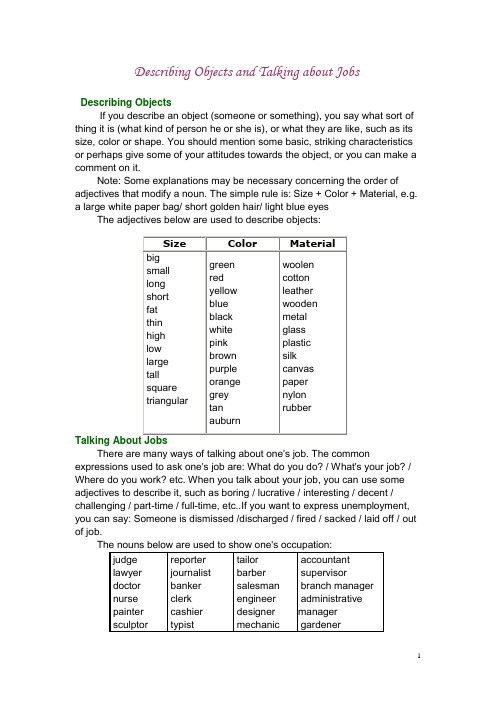
Describing Objects and Talking about JobsDescribing ObjectsIf you describe an object (someone or something), you say what sort of thing it is (what kind of person he or she is), or what they are like, such as its size, color or shape. You should mention some basic, striking characteristics or perhaps give some of your attitudes towards the object, or you can make a comment on it.Note: Some explanations may be necessary concerning the order of adjectives that modify a noun. The simple rule is: Size + Color + Material, e.g.a large white paper bag/ short golden hair/ light blue eyesThe adjectives below are used to describe objects:There are many ways of talking about one's job. The common expressions used to ask one's job are: What do you do? / What's your job? / Where do you work? etc. When you talk about your job, you can use some adjectives to describe it, such as boring / lucrative / interesting / decent / challenging / part-time / full-time, etc..If you want to express unemployment, you can say: Someone is dismissed /discharged / fired / sacked / laid off / out of job.Describing ObjectsYou may describe objects like this:A: Which apple do you like? B: The red one.A: What did your father look like? B: He was short and fat.A: How old is your English teacher? B: He is middle-aged, about forty. She has short golden hair and light blue eyes.My hometown is small and clean.The landscape was easy on the eyes.The day was hot and dusty.The house was old, damp and smelly.Talking about JobsIf you want to know something about someone's work, you may ask: Where do you work?What do you do?/What do you do for a living?What is your line of business?What is your job/occupation?What does your father's job involve? /What's your father?What is your routine work?/What do you do exactly every day? Could you tell me something about your job?What made you decide to become a teacher?Common Answers:I work for Anderson office.I'm a tour guide.I'm a doctor.I'm a secretary.He is the headmaster of our school.He is a gardener.I find a part-time job in a business company.I'm looking for a better job.My job doesn't require special skills.To be a housewife is so boring.Useful Structures1.I'll leave you two here to do ...[structure] Subject + leave (vt.) + sb.(pron.) + to do sth.You use the structure " leave someone to do something" to mean that you go away from them so that they do it on their own.[grammatical points]In this structure the infinitive (to do) is used as objective complement.You can leave an assistant to look after the shop.I will leave you to cook.2. Did anyone find ...?[structure] Did + (Subject) + V. ...?[grammatical point]In this structure, did is the past form of do as an auxiliary. In past tense questions, we put auxiliary did in front of the subject. We use did in any cases, no matter it is a second person or a third person, or whether the subject is singular or plural.__Did you go to the party yesterday?__Yes, we did.__Did he go there?__No, he didn't.3. I'm afraid ...[structure] I'm afraid + object clauseThis structure is used to express your regret in a polite way because sth. unpleasant might happen. The introductive word "that" is often omitted.I'm afraid we can't come.I can't help you, I'm afraid.4.Or the problem could get worse.[structure] or (conj.) + sentenceWe use conjunction "or" to warn someone that he should do something, for if he does not do it , the unpleasant thing will happen.Similars: otherwise, or else, if notHurry up or you will lose your job.[grammatical point]"Get" here means "become".She's getting better.You'll get wet if you go out in the rain without an umbrella.5.It's hard to believe that ...[structure] It (pron.) + be(link verb) + adj.+to do sth.You can use "it" with a link verb and an adjective to describe an experience. After the adjective, you use an"-ing" form or a"to"-infinitive.It was sad to see her the victim of continual pain.It is nice meeting you.[grammatical point]The pronoun "it" can be used as a preparatory subject or preparatory object.It is impossible for us to get there in time. ( "it" as preparatory subject)She finds it boring to stay at home. ( "it" as preparatory object)6.Tottenham are the best to see.[structure] subject + be(link verb)+adjective+to-infinitiveYou can use a to-infinitive clause after a noun group to indicate the aim or purpose of something. You can also use a to-infinitive clause after a noun group that includes an ordinal number, a superlative, or a word like " next", "last", or "only".I think the best way to travel by is on foot.She is always the last person to speak at the meeting.[grammatical point]The to-infinitive clause should be put after the noun group it modifiesUseful Expressionsengineer: n.a civil engineer a mining engineeran electric engineer a mechanical engineerdesigner: n.an industrial designer a fashion designermechanic: n. a car mechanicarchitect: n.architect: n.architecture: n.architectural: adj.electrician: n.Our washing machine has broken; I will ring the electrician.We need an electrician to mend the iron.accountant: n.account: n.transfer: v.transfer from ... to ...He has been transferred from the warehouse to the accounts office.The club's goalkeeper isn't happy here, and has asked for a transfer to another club.supervisor: n.supervise: v.The clerk supervises the work of the department.University students show essays to their supervisors.branch managera shop managera cinema managerdepartmental managera general manageradministrative manageradministrative: adj.an administrative postan administrative problemHer duties are purely administrative.disc-man n.disc brake disc harrow disc jockeypullover n. synonyms: jersey, jumper, sweatersore throat sore adj. e.g. a sore kneeauburn adj.Is your hair black or auburn?set n.A shampoo and set costs £8.She's having her hair set for the party this evening.gleaming adj.cf. gleaming, glimmering, glitteringe.g. gleaming white teethglimmering n.We begin to see the glimmerings of a solution to the problem.glittering adj.A glittering career had been predicted for her in the civil service.giggle v. n.giggle at sb. / sth.Stop giggling, children; this is a serious matter.There was a giggle from the back of the class.wiggle v.Stop wiggling and sit still.The baby was wiggling its toes.mate n. (in BrE. refers to male)He is an old mate of mine.Where are you off to, mate?-mate: companionroommate flat-mate classmate teammate playmate hitHe's a hit with everyone.Her new film is quite a hit.swap v. n.Your book looks more interesting than mine; do you want to swap with me?As you like my dress and I like yours, shall we do a swap?apart from exceptapart adv.The two houses stood 500 meters apart.Apart from his nose. he's quite good-looking.caring adj.Children need a caring environment.plain-looking adj.From a rather plain child, she had grown into a beautiful woman.He is a plain-looking guy.easygoing adj.My mother doesn't mind who comes to stay. She's very easygoing.reliable adj.My memory isn't very reliable these days.pretty adj.She looks pretty in that hat.considerate adj.It was considerate of you not to play the piano while I was asleep.jealous adj.He is a jealous husband.good-looking adj.She's terribly good-looking.amusing adj.Our visits to the theatre made the holiday more amusing.humorous adj.Please see the humorous side of a situation.Main IdeaIn people's mind, some jobs are open only to women while some are open to men. "I" sent off an application for a job with abbreviated name "Chris Neale". "I" successfully got a chance to have an interview, but everybody stared at me in surprise when "I" was there. "I" started to feel nervous because something must have been wrong. Finally "I" came to realize that it was "my" name that had given people a wrong impression and they were surprised that a man should have come to apply for a woman's job. It made me very embarrassed.在人们的观念中,有的工作一定得女人做,有的一定得男人干。
综合英语教程1(第三版)unit课件 PPT
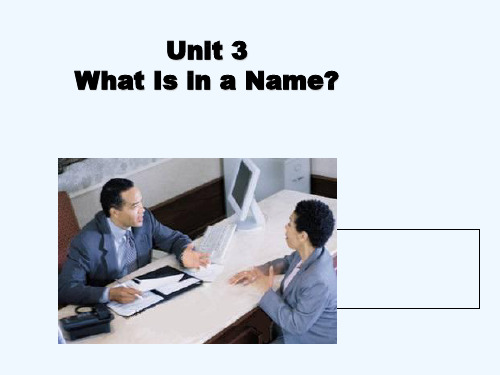
Notes to Conversation 1
Welcome aboard: a colloquial expression for greeting a new member
you guys : you two people I’ll leave you two here to talk about
Toilet dishes搞笑的艺 术游戏用品,把吃饭 的盘子做成马桶形状
Toilet
sucker马 桶抽赌器
Snap circuits儿童
电子线路插板,可以 制作电子玩具
Robot vacuum
cleaner自动真 空吸尘器
Towel rack家
用毛巾架
Weather station
电子天气表
Mthurmouigshaambobrectchdadn dodnee desclirnibees her mum’s actions
And gets us all up for work and school.
I shout at her and make her blue, But I still love her, that’s true. I love her with all my heart, And I hope that we will never part.
summarize her feelings/ attitudes towards her mum
Book 1-Unit 3
Notes to My Dad
Tottenham: one of the best local football teams in England giggle: funny activity/event that causes a viewer/onlooker to
Unit three 重点词汇讲解- 新目标大学英语《综合教程》 第一册
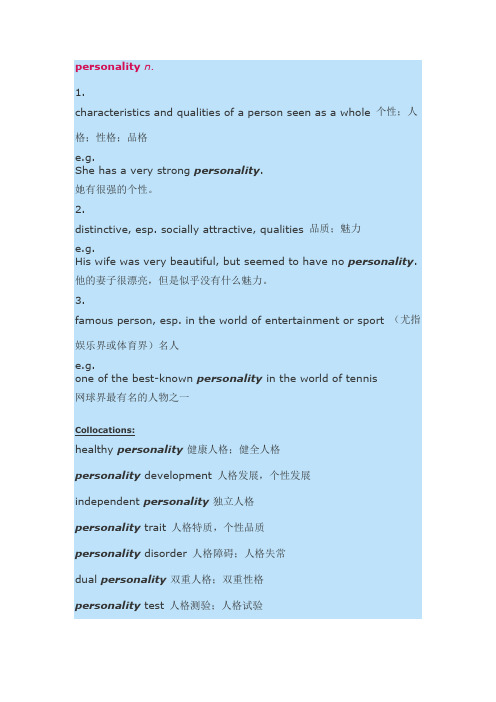
1.characteristics and qualities of a person seen as a whole 个性;人格;性格;品格e.g.She has a very strong personality.她有很强的个性。
2.distinctive, esp. socially attractive, qualities 品质;魅力e.g.His wife was very beautiful, but seemed to have no personality. 他的妻子很漂亮,但是似乎没有什么魅力。
3.famous person, esp. in the world of entertainment or sport (尤指娱乐界或体育界)名人e.g.one of the best-known personality in the world of tennis网球界最有名的人物之一Collocations:healthy personality健康人格;健全人格personality development 人格发展,个性发展independent personality独立人格personality trait 人格特质,个性品质personality disorder 人格障碍;人格失常dual personality双重人格;双重性格personality test 人格测验;人格试验quality or state of being widely liked, admired or sought after 受追捧;被拥戴;受大众欢迎e.g.win / gain / enjoy / command the popularity of the voters赢得(得到、享有、博得)选民的拥戴The story had an extensive popularity among American readers. 这本小说广受美国读者的欢迎。
新通用大学英语综合教程1第三单元语言点

新通用大学英语综合教程1第三单元语言点Unit 3 Talking About FamiliesLesson 1Listeningkid n. 孩子architect n. 建筑师;设计师divorced adj. 离婚的baseball n. 棒球;棒球运动cute adj. 逗人喜爱的;娇小可爱的chef n. 厨师fluent adj. 流畅的;流利的originally adv. 最初;开始blond adj. (头发)金黄色的actually adv. 实际上;真实地prefer v. 更喜欢;宁愿multiple adj. 多倍的;复合的twin n. 双胞胎triplet n. 三胞胎quadruplet n. 四胞胎quintuplet n. 五胞胎bathe v. 给…洗澡;洗浴soccer n. 英式足球gymnastics n. 体操relative n. 亲戚burden n. 负担;重载crash v. 坠毁;撞击thunder n. 雷;雷声come over 顺便访问;过来calm down 冷静下来,镇定下来wipe off 擦拭;去掉in all 总计;一共at the same time 同时all night long 整夜none of one’s business不关某人的事fall ill 生病,得病Text Atwin: n. one of two offspring born at the same birth 双胞胎It is a great convenience to have a separate room for the twins.Clones are always produced by natural means in the shape of identical twins.divorced: adj. of or relating to the ending of a marriage between a husband and a wife 离婚It seems as though every time I turn around, another couple I know is getting divorced.Her ex-husband drank a lot of alcohol every evening, which was the reason she was divorced from him.identical: adj. being the same; exactly equal and alike 同一的;完全相等的Marianne and Anne are identical twins. You will find it very hard to tell them apart.The jobs of wildlife technicians and biologists seemed identical to him, but one day he discovered their difference.graphic: adj. concerned with written signs, usu. drawings or graphs 绘画的,绘图的This central part of the program is responsible for the graphic descriptions of the playing field.Susan specializes in graphic design, an art of combining pictures, words and decoration in the production of books, magazines and etc.athletic: adj. physically strong; of or relating to sports 身强力壮的;运动的Lily fell in love with Peter, a tall athletic young man she met at a dance party.Athletic events at universities attract lots of fans and benefit the whole community.in some ways: to some degree or extent 在某些方面The return trip of the rocket to Earth is, in some ways, less of a problem.Although the United States is so big and its people have so many different backgrounds, it is in some ways less varied than Europe.all types of: all kinds of 各种各样的The major studios are eager to profit from the DVD market, filling it with all types of films and TV series.People in all types of societies organize themselves in relation to each other for work and other duties, and to structure their interactions.a variety of: a lot of things of the same type that are different from each other in some way 多种多样的Everyone arrived late at the party due to a variety of reasons.In civilizations, many people specialize in offering a variety of services and producing a variety of goods.live apart: live in separate places 分居My wife and I have been living apart for almost one full year.Living apart from her parents for the first time, Mary felt very homesick.Text Bseptuplet: n. one of seven offspring delivered at a single birth 七胞胎It is rather rare for a mother to give birth to septuplets.Mrs. Green gave birth to septuplets last week --- four sons and three daughters.housework: n. the tasks, such as cleaning and cooking, that are performed in housekeeping 家事,家务活Washing machines and other inventions allow people to spend less time doing housework. Computers will run our homes, controlling the heating, air conditioning and cooking system while robots will deal with the housework.adopt: v. take into one's family throu gh legal means and raise as one’s own child 收养David and Sheila are unable to have children, but they’re hoping to adopt a little boy.The old couple decided to adopt a boy and a girl though they already had three children. kid: n. a child 孩子For no apparent reason this nine-year-old kid kicked my friend's dog.It doesn’t help if parents treat the teenager as a big kid, and demands obedience. traditional: adj. of, relating to or in accord with opinions, beliefs, customs, etc. passed down from the past to the present 传统的It was traditional for the family to bring a special cake along to celebrate the occasion. Throughout history, people around the world have used traditional medicines made from plants.policy: n. a plan or course of action, as of a government, political party, or business, intended to influence and determine decisions, actions and other matters 政策;方针Concern for the environment is reflected in the government’s new energy policy.In the United States, the foreign policy is decided by the federal government, not by each state.the next day: the following day 次日The criminal was caught alive though he died from wounds the next day.Tom telephoned the house agency and arranged to go down by train the next day and have a look at the house.givebirth to: produce (a baby, etc.) 生(孩子);生产Patsy’s family held a celebration party last night after her giving birth to twins.My elder sister gave birth to a healthy baby girl about eighteen months ago.helpwith: assist sb. to do sth. by doing part of their work or by giving them sth. they need 帮忙某人做I’m afraid I don’t have time to help with the performance on the 19th.Many architects have resisted the idea that a computer can help with design.start with: begin with 以…开始T here’s so much to do, I don't know what to start with.The national musical festival started with a huge fireworks display.agree with: have or express the same opinion about sth. as someone else 同意Personally, I don’t agree with spending so much money on the project.If anyone here does not agree with me, he should put forward his own plan for improving the living conditions of these people.lesson 2listeningwhereas conj. 然而;但是talkative adj. 健谈的;多嘴的stuff n. 东西;材料fund n. 基金;专款occasion n. 场合;机会hectic adj. 紧张忙碌的;激动的,兴奋的jog v. 慢跑in-law n. 姻亲ex-husband n. 前夫unfortunately adv. 不幸地similarity n. 相似;近似sociologist n. 社会学家independently adv. 独立地;自立地household adj. 家庭的chore n. 家务杂事interfere v. 干涉,干预apart from 除…之外first of all 首先in general 大体上;一般而言or something 或是…之类at the present time 目前end up 告终,结束interfere in 干涉,干预Text Ctrend: n. general direction in which sth. tends to move 倾向;趋向In the modern society there is a growing trend towards smaller families.In some factories, the replacement of human workers by robots seems to be a trend. adulthood: n. the period during which a person or animal is fully grown 成人期The transition from childhood to adulthood is always a critical time for everybody.In the passage of human life, middle age is the phase that follows young adulthood and precedes old age.diploma: n. a document issued by an educational institution 文凭;毕业证书Failure in a required subject may result in the denial of a diploma.Firm belief in God stands at 74 percent among Canadians without a high-school diploma and at 60 percent among those with university degrees.totally: adv. entirely; completely 完全地;彻底地It is wrong to regard our work as totally good or as completely bad.Living on my own is a totally different experience for three main reasons: being more responsible, more decisive and more creative.online: adj. directly connected so that a computer immediately receives an input from or sends an output to a peripheral process 在线的;联机的Though faced with many difficulties, he would not give up online learning.How someone imagines an online friend is often quite different from the real person. survey: n. an investigation of public opinion 调查A new survey has revealed that over 87 percent of 11 to 16 year-olds use a mobile phone. According to a recent survey, employees in many companies today work longer hours than employees did in 1979.tough: adj. demanding or troubling; difficult 费力的;困难的American football has a reputation for being a tough and dangerous game.Anne is having a tough time giving up a habit she has had since getting married at the age of 15.economy: n. a condition or system of a community’s wealth creation 经济;经济体系Experts of all kinds offered new ideas on how to improve the local economy.Some bankers had even begun to fear that the economy was growing too fast. respondent: n. one who gives an answer 答复者Only 62 percent of respondents said they were satisfied with their current standard of living.A respondent is a person who answers a questionnaire or a request for information of some kind.sociology: n. the study of human social behavior 社会学Alex studied economics at college, but changed to sociology when he entered graduate school.Sociology is an attempt to build up a set of logical and consistent theories about the society in which we live.phenomenon: n. a fact or event in nature or society as it appears or is experienced by the senses 现象Although fear of math is not a purely female phenomenon, girls tend to drop out of math sooner than boys.Today everything about the Internet experience generally and the dot-com phenomenon in particular are in doubt.-somethingsadj.(与数字连用构成表示概数的形容词,尤其用于指人的年龄)表示“…几”,“…多”-something is combined with numbers such as twenty and thirty to form adjectives which indicate an approximate amount, especially someone’s age. For example, if you say that someone is thirty-something, you mean they are between thirty and forty years old.n. (二十)几岁的人;(三十)多岁的人People of a similar age range are sometimes referred to as, for example, twenty-somethings or thirty-somethings .Most American twenty-somethings do not read about politics.绝大多数二十多岁的美国人不读政治方面的东西。
- 1、下载文档前请自行甄别文档内容的完整性,平台不提供额外的编辑、内容补充、找答案等附加服务。
- 2、"仅部分预览"的文档,不可在线预览部分如存在完整性等问题,可反馈申请退款(可完整预览的文档不适用该条件!)。
- 3、如文档侵犯您的权益,请联系客服反馈,我们会尽快为您处理(人工客服工作时间:9:00-18:30)。
Describing Objects and Talking about JobsDescribing ObjectsIf you describe an object (someone or something), you say what sort of thing it is (what kind of person he or she is), or what they are like, such as its size, color or shape. You should mention some basic, striking characteristics or perhaps give some of your attitudes towards the object, or you can make a comment on it.Note: Some explanations may be necessary concerning the order of adjectives that modify a noun. The simple rule is: Size + Color + Material, e.g.a large white paper bag/ short golden hair/ light blue eyesThe adjectives below are used to describe objects:There are many ways of talking about one's job. The common expressions used to ask one's job are: What do you do? / What's your job? / Where do you work? etc. When you talk about your job, you can use some adjectives to describe it, such as boring / lucrative / interesting / decent / challenging / part-time / full-time, etc..If you want to express unemployment, you can say: Someone is dismissed /discharged / fired / sacked / laid off / out of job.Describing ObjectsYou may describe objects like this:A: Which apple do you like? B: The red one.A: What did your father look like? B: He was short and fat.A: How old is your English teacher? B: He is middle-aged, about forty. She has short golden hair and light blue eyes.My hometown is small and clean.The landscape was easy on the eyes.The day was hot and dusty.The house was old, damp and smelly.Talking about JobsIf you want to know something about someone's work, you may ask: Where do you work?What do you do?/What do you do for a living?What is your line of business?What is your job/occupation?What does your father's job involve? /What's your father?What is your routine work?/What do you do exactly every day? Could you tell me something about your job?What made you decide to become a teacher?Common Answers:I work for Anderson office.I'm a tour guide.I'm a doctor.I'm a secretary.He is the headmaster of our school.He is a gardener.I find a part-time job in a business company.I'm looking for a better job.My job doesn't require special skills.To be a housewife is so boring.Useful Structures1.I'll leave you two here to do ...[structure] Subject + leave (vt.) + sb.(pron.) + to do sth.You use the structure " leave someone to do something" to mean that you go away from them so that they do it on their own.[grammatical points]In this structure the infinitive (to do) is used as objective complement.You can leave an assistant to look after the shop.I will leave you to cook.2. Did anyone find ...?[structure] Did + (Subject) + V. ...?[grammatical point]In this structure, did is the past form of do as an auxiliary. In past tense questions, we put auxiliary did in front of the subject. We use did in any cases, no matter it is a second person or a third person, or whether the subject is singular or plural.__Did you go to the party yesterday?__Yes, we did.__Did he go there?__No, he didn't.3. I'm afraid ...[structure] I'm afraid + object clauseThis structure is used to express your regret in a polite way because sth. unpleasant might happen. The introductive word "that" is often omitted.I'm afraid we can't come.I can't help you, I'm afraid.4.Or the problem could get worse.[structure] or (conj.) + sentenceWe use conjunction "or" to warn someone that he should do something, for if he does not do it , the unpleasant thing will happen.Similars: otherwise, or else, if notHurry up or you will lose your job.[grammatical point]"Get" here means "become".She's getting better.You'll get wet if you go out in the rain without an umbrella.5.It's hard to believe that ...[structure] It (pron.) + be(link verb) + adj.+to do sth.You can use "it" with a link verb and an adjective to describe an experience. After the adjective, you use an"-ing" form or a"to"-infinitive.It was sad to see her the victim of continual pain.It is nice meeting you.[grammatical point]The pronoun "it" can be used as a preparatory subject or preparatory object.It is impossible for us to get there in time. ( "it" as preparatory subject)She finds it boring to stay at home. ( "it" as preparatory object)6.Tottenham are the best to see.[structure] subject + be(link verb)+adjective+to-infinitiveYou can use a to-infinitive clause after a noun group to indicate the aim or purpose of something. You can also use a to-infinitive clause after a noun group that includes an ordinal number, a superlative, or a word like " next", "last", or "only".I think the best way to travel by is on foot.She is always the last person to speak at the meeting.[grammatical point]The to-infinitive clause should be put after the noun group it modifiesUseful Expressionsengineer: n.a civil engineer a mining engineeran electric engineer a mechanical engineerdesigner: n.an industrial designer a fashion designermechanic: n. a car mechanicarchitect: n.architect: n.architecture: n.architectural: adj.electrician: n.Our washing machine has broken; I will ring the electrician.We need an electrician to mend the iron.accountant: n.account: n.transfer: v.transfer from ... to ...He has been transferred from the warehouse to the accounts office.The club's goalkeeper isn't happy here, and has asked for a transfer to another club.supervisor: n.supervise: v.The clerk supervises the work of the department.University students show essays to their supervisors.branch managera shop managera cinema managerdepartmental managera general manageradministrative manageradministrative: adj.an administrative postan administrative problemHer duties are purely administrative.disc-man n.disc brake disc harrow disc jockeypullover n. synonyms: jersey, jumper, sweatersore throat sore adj. e.g. a sore kneeauburn adj.Is your hair black or auburn?set n.A shampoo and set costs £8.She's having her hair set for the party this evening.gleaming adj.cf. gleaming, glimmering, glitteringe.g. gleaming white teethglimmering n.We begin to see the glimmerings of a solution to the problem.glittering adj.A glittering career had been predicted for her in the civil service.giggle v. n.giggle at sb. / sth.Stop giggling, children; this is a serious matter.There was a giggle from the back of the class.wiggle v.Stop wiggling and sit still.The baby was wiggling its toes.mate n. (in BrE. refers to male)He is an old mate of mine.Where are you off to, mate?-mate: companionroommate flat-mate classmate teammate playmate hitHe's a hit with everyone.Her new film is quite a hit.swap v. n.Your book looks more interesting than mine; do you want to swap with me?As you like my dress and I like yours, shall we do a swap?apart from exceptapart adv.The two houses stood 500 meters apart.Apart from his nose. he's quite good-looking.caring adj.Children need a caring environment.plain-looking adj.From a rather plain child, she had grown into a beautiful woman.He is a plain-looking guy.easygoing adj.My mother doesn't mind who comes to stay. She's very easygoing.reliable adj.My memory isn't very reliable these days.pretty adj.She looks pretty in that hat.considerate adj.It was considerate of you not to play the piano while I was asleep.jealous adj.He is a jealous husband.good-looking adj.She's terribly good-looking.amusing adj.Our visits to the theatre made the holiday more amusing.humorous adj.Please see the humorous side of a situation.Main IdeaIn people's mind, some jobs are open only to women while some are open to men. "I" sent off an application for a job with abbreviated name "Chris Neale". "I" successfully got a chance to have an interview, but everybody stared at me in surprise when "I" was there. "I" started to feel nervous because something must have been wrong. Finally "I" came to realize that it was "my" name that had given people a wrong impression and they were surprised that a man should have come to apply for a woman's job. It made me very embarrassed.在人们的观念中,有的工作一定得女人做,有的一定得男人干。
